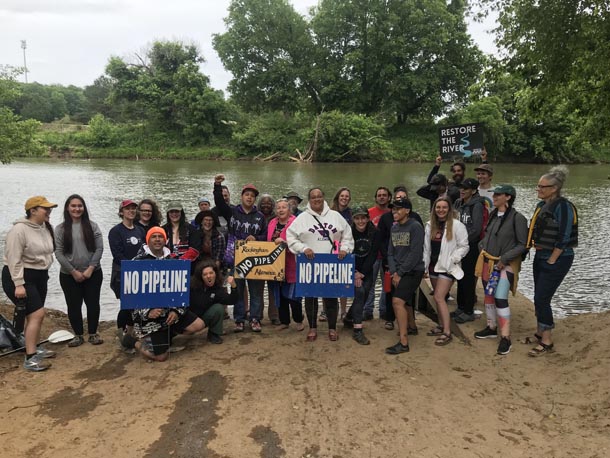Rights of Nature
House Bill 795 would give the Haw River legal status based on a legal theory that nature is alive, a Native American belief.
7 Directions of Service (7DS) is an Indigenous-led environmental justice and community organizing collective based on Occaneechi-Saponi homelands in rural North Carolina. The organization is advocating for legal Rights of Nature, a new kind of conservation law rooted in Indigenous values.
“Rights of Nature is a natural law. It’s … how the natural world works,” said Crystal Cavalier-Keck, co-founder of Seven Directions of Service. “We are born in water. When we die, we … return to the earth. People just have forgotten that simple rule: That we are nature.”
“We are giving the rights and laws to that body of water, or that body of trees, to sue or go to court on behalf of something that is polluting or destroying it. Kind of like how corporations have rights.”
7DS is working with a bipartisan network of community members, grassroots organizations, Indigenous mentors, elected officials and legal experts to advance legal Rights of Nature in North Carolina.
Being granted legal rights affords the highest protections possible under the law, and its benefits for ecosystems include expanded “standing” for enforcement, new and elevated standards of protection, and restoration required as a remedy. Rights of Nature laws recognize the health of our communities as dependent upon the health of our lands and waterways.
If passed, House Bill 795 would be the first state-level Rights of Nature law in the US. The bill was introduced by Rep. Pricey Harrison. Sponsors include Rep. John Autry, House Democratic Whip Rep. Marcia Morey, Rep. Rosa U. Gill, Rep. Zack Hawkins, and Rep. Caleb Rudow.

The growing number of Rights of Nature supporters–from youth, to faith leaders, farmers and elected officials–are motivated by the failure of conventional conservation laws to protect the river and surrounding communities.
Article XIV in the NC Constitution speaks to the “conservation of natural resources”, however its application is limited to state and local government bodies acquiring natural spaces in order to preserve them. Higher standards of protection, community participation, accountability, and restoration are needed.
The Rights of the Haw River Ecosystem Act, House Bill 795 would secure the right of North Carolinians to a “healthy, flourishing Haw River ecosystem,” while protecting the “collective or individual rights of indigenous people residing in the State.”
More than three dozen cities, townships, counties and tribal nations across the US have adopted Rights of Nature laws and policies to protect their local ecosystems. The health of our waterways, wildlife, and communities in NC are inseparable and deserve the highest level of legal protection.
Stop the MVP Southgate Extension
In 2018, construction on the 303-mile fracked-gas Mountain Valley Pipeline (MVP) began in Virginia and West Virginia. Construction has involved over 500 violations of permit conditions, laws, and regulations, and 75% of the route slices through landslide and earthquake-prone terrain, including sacred Indigenous burial sites, waterways, and the Jefferson National Forest.
In June 2023, the MVP mainline was fast-tracked by Congress and the White House, a result of its inclusion in the nation’s must-pass debt ceiling legislation. The corrupt MVP provision forbids judicial review of any permits.
The North Carolina Department of Environmental Quality agrees that that MVP Southgate is an unneeded risk. In August 2020, the agency denied Southgate’s application for a Clean Water Act permit.
The Mountain Valley Pipeline Southgate Extension is a proposed 73-mile extension of the Mountain Valley Pipeline mainline. It’s proposed path goes from Pittsylvania County, VA into North Carolina’s Rockingham and Alamance Counties, posing a grave danger to working class and farming families, and the entire ecosystem of the Piedmont region, including the Haw River.
The project would also require a polluting compressor station to be constructed in a predominantly Black community near Chatham, VA. The pipeline’s construction through the Virginias is supported by Sen. Joe Manchin, the West Virginia Democrat who struck a deal with the White House to approve the permits for the project as part of the debt ceiling law.
Safety Concerns
On July 25, 2023, TC Energy’s Columbia gas pipeline exploded in Shenandoah County, Virginia, close to Interstate 81. The blast caused gigantic flames visible from the highway, and threw sections of the pipe into the air. An explosion on the MVP would be enormous and catastrophic. The Columbia gas pipeline (26 inches) is much smaller in diameter than the MVP (42 inches).
The pipe meant to complete construction of MVP has been sitting in the open sun, in some cases, for 4-6+ years. This degrades the Fusion-bonded epoxy coating, reducing the pipe’s integrity and potentially leading to weld failures & leaks. Use of degraded pipe also increases the risk of explosion.
North Carolinians should not be exposed to the risk of this pipeline project.
To learn more about Rights of Nature, please visit 7directionsofservice.com/rights-of-nature. To sign the petition to stop the MVP Southgate, go to stopmvpsouthgate.com.








